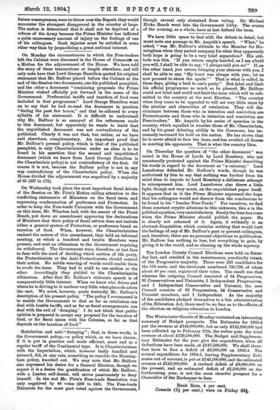We have little space to deal with the debate in
detail, but must note one passage in Mr. Asquith's speech. "What," he asked, "was Mr. Balfour's attitude to the Member for Bir- mingham when they parted company for what they apparently both hope is going to be a very brief separation P His atti- tude was this. If you return empty-handed, as I am afraid you will, I shall be able to say, "I always told you so!" If, on the other hand, you return bringing your sheaves with yon, I shall be able to say, "My heart was always with you ; let us now proceed to share the spoils." ' That is what is called, in these days, giving a lead to one's party." But label and limit his official programme as much as be pleased, Mr. Balfour could not label and could not limit the issue which will be sub- mitted to the country at the next Election. "The country when they come to be appealed to will set very little store by the niceties and obscurities of retaliation. They will dis- criminate between those who in intention and conviction are Protectionists and those who in intention and conviction are Free-traders." Mr. Asquith by his series of speeches in the country, which equalled in number those of Mr. Chamberlain, and by his great debating ability in the Commons, has im- mensely increased his hold on the nation. He has shown that he is never afraid to face the issue, and has avoided all finesse in meeting his opponents. That is what the country likes.










































 Previous page
Previous page